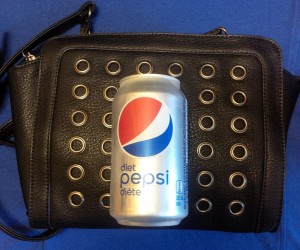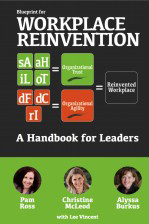Organizational Trust is critical to high performance and success. On the other hand, if employees are treated unfairly as thieves and criminals, they will understandably become disgruntled, and have an impact on overall company success.
The Bodily Function Story!
Last week, I walked into a large department store. I had a large bag with me, a purse, and was on my way to the car, when a purse caught my eye (a relatively small black cross-body purse – see inset).
cross-body purse – see inset).
I walked up to the counter to purchase my new find. The Associate behind the counter was about 30, attractive, and stylishly dressed. She didn’t make eye-contact when I approached. Her eyes were downcast, and she appeared glum. She touched the purse slowly, and asked me in a monotone voice (without looking up), “Is there a smaller one of these? It’s really nice.”
When I told her there wasn’t a smaller version, she looked up at me and continued, “We can’t use a purse here that size. It has to be really small.” Her hands then motioned a size that would probably hold a small wallet and a cell phone. “If it’s bigger than that, it has to be locked up” she said. I looked down at the purse I was about to purchase. It didn’t seem unreasonable for her to use.
And then without hesitation she asked hypothetically, “What are we supposed to do when we have our period? There is no room for what we need – you know what I mean? How do I run back to my locked bag, to get a pad for my period?”
All I could say was that I was sorry, and that “Yes it would be an issue”.
Should bodily functions be included in any customer experience? Of course not.
The Associate should NOT have been talking about her period with me. But I felt sorry for this woman. She was talking about a human experience, and the store obviously wasn’t accommodating. Although this store undoubtedly had the best of intentions, and they are certainly not alone in their loss prevention policy, they are actually hurting their staff, their culture, and their customers.
I used to work at a retail Home Office. I get it. Retailers are scared.
As reported by PricewaterhouseCoopers (PWC):
- Canadian retailers are losing about $4 billion to shrink, which equates to an average estimated loss of $10.8 million per shopping day.
- Shrinkage is the loss of inventory caused by different sources such as theft by employees, customers, organized crime, inventory/accounting errors, fraud, and damaged product loss.
Loss prevention is obviously a big issue. But there needs to be better ways to deal with it. And, if you realize that it isn’t okay to treat your CUSTOMERS as criminals then don’t treat your EMPLOYEES as the enemy. Retailers are somewhat “relaxed” with customers. They don’t want to infringe on the honest shoppers out there. Yes, there are shopping “watchers” and there usually is an eye-in-the-sky, but people are generally not aware, and their experience is not compromised.
What is the answer?
If I had the absolute answer to combat retail shrinkage in Canada, I would be a very rich woman. No, I don’t have the perfect answer. But, I know that a balance needs to be developed to accommodate trustworthy employees, and reduce retail shrinkage.
- Small bags and purses are not the answer – If people want to steal they will get creative.
- Disgruntled employees are not healthy to your culture or your customer experience. Stop treating them like criminals, and let them have proper bags to hold their personal items.
- Instead of treating them like criminals, help them to be HEROES! Train employees to identify theft and wastage, and how it impacts the company.
- TRUST your hires, and HIRE SMART! Watch for those red flags, and develop a pre-employment verification system. According to PWC, only three out of five retailers perform pre-employment screenings before hiring new staff, only 29% request new employees to pass a background check. This may seem hypocritical, but this is BEFORE they are employees. Rule out those that have recent theft or other related crimes before they become part of your family.
- Share financials. As part of creating trust and open transparent culture, retailers need to share financials with their people, explaining how their margin works, how much they actually make on the dollar and how much shrink costs them.
Once your employees are hired, trust them and don’t treat them like criminals. Trust is essential to employee performance, and ultimately this has an effect on the bottom line.
Want to get ahead of the competition? Check out our eBooks!
| Workplace Reinvention Handbook describes how to build Digital Fluency and Authentic Humanity ($3.99) |
New eBook all about Digital Fluency for Businesses (Sign up to receive it FREE) |
|---|---|
 |
 |

